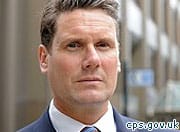A severely paralysed man has launched a legal action in the High Court which could allow his wife to kill him and escape being prosecuted for murder.
Critics say that any weakening of the law would endanger the lives of some of the nation’s most vulnerable members.
Earlier this year the Crown Prosecution Service released guidance saying that people were unlikely to be prosecuted for assisting a suicide if they were “wholly motivated by compassion”.
Paralysed
But Tony Nicklinson, who can only communicate by blinking and nodding, is so severely paralysed that he would be unable to take part in his own assisted suicide.
And the father-of-two, whose condition is called ‘Locked-in syndrome’, is now seeking clarification about whether his wife would be prosecuted for murder if she killed him.
Mr Nicklinson’s legal team have issued proceedings in the High Court seeking a Judicial Review of Keir Starmer QC, the Director of Public Prosecutions (DPP), and asking for guidance on whether it is always in the public interest to prosecute cases of ‘consensual killing’.
Mr Nicklinson’s legal team claims that the current law on murder represents a “disproportionate interference” with his human rights.
Burden
Dr Andrew Fergusson, from Care Not Killing, said: “Old people often feel a sense of burden and don’t see the point of living.
“And I think large numbers of people – the elderly, the depressed, and the disabled – would be put almost under a sense of duty to die if we were to change the law.”
Mr Nicklinson, whose case is being supported by the pro-euthanasia group Dignity in Dying, has been severely paralysed since suffering a stroke in 2005.
Murder
Jane Nicklinson, his wife, said: “He does not feel he has any quality of life and wants the right which everyone else has to decide when to end it.
“He will not ask me to help him, or anyone else to help him, if he thinks they will be prosecuted for murder.”
A spokesman for the Crown Prosecution Service said: “Suicide, whether assisted or not, and murder are very different acts in that the former requires a person to take their own life, whereas the latter involves a person doing an act that ends the life of another”.
“This remains a fundamental distinction even if that act is done on the basis that the person is simply complying with the wishes of the other individual concerned.”
Live
Last week it was revealed that a paralysed father-of-two was about to have his life support machine turned off when he signalled to doctors that he wanted to live by using eye movements.
The family of motorcycle enthusiast, Richard Rudd, had decided to switch off the machine based on comments he had made in the past.
Speculating on what he would do if he were ever paralysed by a motorcycling accident, Mr Rudd had previously said he wouldn’t want to live.
But doctors realised Mr Rudd had changed his mind when they discovered he was able to move his eyes in response to questions.
You just don’t know what will happen
In his book Against Physician Assisted Suicide, Dr David Jeffrey tells the story of a former army instructor who was being treated for terminal cancer and was determined to commit suicide.
After a discussion with the doctor, it emerged that he was missing the Army, and was subsequently taken to watch a passing-out parade of young recruits, where a party had been arranged in his honour.
“His life was transformed,” Dr Jeffrey said. “He had a purpose and his demeanour completely changed. He died two weeks later, comfortably. People’s lives always have that potential. Even in the midst of suffering there can be change.
“You just don’t know what will happen.”
A different life
The Times reported the story of Matt Hampson, a former rugby player who was paralysed from the neck down during training and now requires a ventilator to breathe.
With the help of carers and a custom-built house, he has been able to set up a website, is writing an autobiography and is the patron of a charity for disabled children called Special Effects.
He says: “I don’t live a bad life, I live a different life. I use my brain more than my brawn now. It has helped me become a more rounded person. I think about things more.
“I’ve had to grow up quite a bit and do things that most 23-year-olds don’t do.”
I’m grateful I wasn’t allowed to end it all!
Alison Davis is National Co-ordinator of No Less Human. She was born with severe spina bifida, and is dependent on a wheelchair. She is often in extreme pain for hours at a time. She says that for many years she wanted to “end it all”.
“If euthanasia had been legal, I would certainly have requested it and I wouldn’t be here now,” she says.
But after several serious suicide attempts, blocked by the intervention of Alison’s friends, she began to change her mind.
Alison met the disabled children she had been sponsoring through a charity. The experience led her to think, for the first time in over ten years, “I think I want to live”.
She says: “I’ll always be grateful to the friends who saved my life (though I wasn’t at the time). And I’m especially thankful there was no possibility of persuading my doctors to legally help me die.”
She believes that disabled people “deserve the same kind of help routinely given to those who do not have a physical condition but who feel suicidal”.

